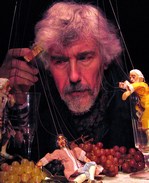SITE GUIDE
SEARCH
REVIEWS
REVIEW ARCHIVES
ADVERTISING AT CURTAINUP
FEATURES
NEWS
Etcetera and
Short Term Listings
LISTINGS
Broadway
Off-Broadway
NYC Restaurants
BOOKS and CDs
OTHER PLACES
Berkshires
London
California
New Jersey
DC
Connecticut
Philadelphia
Elsewhere
QUOTES
TKTS
PLAYWRIGHTS' ALBUMS
LETTERS TO EDITOR
FILM
LINKS
MISCELLANEOUS
Free Updates
Masthead
A CurtainUp Review
Twelfth Night
| If music be the food of love, play on,/Give me excess of it that surfeiting/The appetite may sicken and so die.-- .— Orsino
|

Puppeteer/director Vit Horejs with (L-R) Valentine, Orsino and Curio.
Puppets by Milos Kasal.
(Photo by Jonathan Slaff) |
The non-linear, convoluted story of Twelfth Night is best summed up as a tale of rebirth that chronologically begins with a shipwreck that separates the adult twins Viola and Sebastian at sea. Though each twin believes the other drowned, both miraculously wash ashore on the coast of Illyria. To survive the catastrophe, Viola cross-dresses as the boy "Cesario" (Latin for "little monarch") and gains employment at the court of Duke Orsino. Her brother Sebastian will appear later in various parts of Illyria, most conspicuously on the aristocratic estate of Countess Olivia. It's all a rich tapestry of bereavement, a search for self-identity, revelry (with a motley group of servants), a probing examination of all kinds of human desire, plus some unfinished business for at least one character (the steward Malvolio). And it is only at the play's end that Orsino and Olivia, the young lovers and central characersare happily matched and the triangulated love affairs resolved (sort of).
This puppet production of Twelfth Night surprisingly and delightfully reverses the notion that Shakespeare is all about elevated language and larger-than-life personages. The play is literally served up on a three-tea-tray set (design by Emily Wilson). And though some of the original text is carved away to streamline this 90-minute adaptation, what remains is still an authentic rendering of Shakespeare's work that was written circa 1601.
The production does have it's drawbacks in that it fails to deliver on the drama's full emotional impact. Although the actor-puppeteers do engage themselves in certain scenes to heighten the dramatic effect, the evening nevetheless plays out like a Punch-and-Judy show with Shakespearean motifs tacked on. Without live actors impersonating Shakespeare's characters, you get the outline of the story without the onion-like layers hidden beneath. So don't go to this Twelfth Night expecting your emotions to be plumbed to their deepest depths or raised to their highest heights.
This is an event to be enjoyed for its rich artfulness, not its profound qualities — to appreciate how Vit Horejs directs with an elfin touch that casts a magical aura over the entire evening's proceedings. The actor-puppeteers (Deborah Beshaw, Michelle Beshaw & Vit Horejs) are virtuosos at handling their cadre of tiny puppets as well as maneuvering the three portable carts that support the tea-tray stages. Each marionette is a one-of-a-kind antique, exquisitely detailed, and each will surely reawaken the child in you.
The most memorable scenes revolve around the Duke Orsino, portrayed here as an uptown decadent type, lounging atop a hollowed-out lobster shell. Although he thinks he's in love with the Countess Olivia, Orsino is really in love with the idea of love. Consider this revealing moment when Orsino, having exhausted his romantic imagination, picks up a lobster claw and gives it to "Cesario" to deliver to the Countess as love-bait. Was ever woman in this humour wooed? Was ever woman in this humour won? To her credit, Olivia never accepts Orsino's love. Unlike Lady Anne in King Richard III, the Countess listens to her heart, not her physical appetites or feminine fears.
This is Shakespeare dramatized into delicious bite-sized pieces that nobody can —or should—resist. Compliments to the Czechoslovak-American Marionette Theatre (CAMT for demonstating that puppets can deliverShakespeare's work with charming inventiveness.
Editor's Note: For reviews of other Twelfth Night productions reviewed at Curtainup, see our Shakespeare Page which contains links to reviews and quotations.
|
Twelfth Night by William Shakespeare Adapted and Directed by Vit Horejs Cast: Deborah Beshaw (Valentine, Sir Toby, Olivia, Antonio), Michelle Beshaw (Curio, Viola, Andrew Aguecheek, Sebastian), Vit Horejs (Orsino, Captain, Maria, Fool, Malvolio, Officer) Sets: Emily Wilson Costumes: Emily Wilson and Michelle Beshaw Lighting: Federico Restrepo Marionettes: Milos Kasal Running time: 90 minutes with no intermission. La Mama E.T.C. (at the First Floor Theatre) at 74A East 4th Street, tickets are $18, phone (212) 475-7710 or visit www.lamama.org From 11/12/09; closing 11/29/09. Thursday through Saturday @ 8pm and Sunday @ 2:30pm. Reviewed by Deirdre Donovan based on November 12 th press performance |
|
REVIEW FEEDBACK Highlight one of the responses below and click "copy" or"CTRL+C"
Paste the highlighted text into the subject line (CTRL+ V): Feel free to add detailed comments in the body of the email. . .also the names and emails of any friends to whom you'd like us to forward a copy of this review. You can also contact us at Curtainup at Facebook or Curtainup at Twitter |
|
Subscribe to our FREE email updates with a note from editor Elyse Sommer about additions to the website -- with main page hot links to the latest features posted at our numerous locations. To subscribe,
E-mail: esommer@curtainup.comesommer@curtainup.com
put SUBSCRIBE CURTAINUP EMAIL UPDATE in the subject line and your full name and email address in the body of the message -- if you can spare a minute, tell us how you came to CurtainUp and from what part of the country. |






